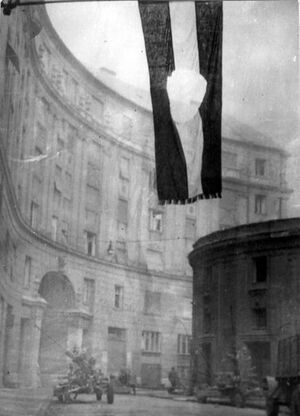Lyonheimerish Communist Revolution: Difference between revisions
Lyooonheimer (talk | contribs) No edit summary |
Lyooonheimer (talk | contribs) No edit summary |
||
| (2 intermediate revisions by the same user not shown) | |||
| Line 24: | Line 24: | ||
| combatant3 = | | combatant3 = | ||
| commander1 = [[File:Screenshot_2021-04-13_140436.png|23px]] [[Milkos Varmaskov]] <br> [[File:Screenshot_2021-04-13_140436.png|23px]] Donat Szoke <br> [[File:Screenshot_2021-04-13_140436.png|23px]] Oszkár Asbóth <br> [[File:Screenshot_2021-04-13_140436.png|23px]] Rajmund Ittzes <br> [[File:Screenshot_2021-04-13_140436.png|23px]] Demetor Ruzsa <br> [[File:Screenshot_2021-04-13_140436.png|23px]] András Hadik <br> [[File:Screenshot_2021-04-13_140436.png|23px]] András Hadik | | commander1 = [[File:Screenshot_2021-04-13_140436.png|23px]] [[Milkos Varmaskov]] <br> [[File:Screenshot_2021-04-13_140436.png|23px]] Donat Szoke <br> [[File:Screenshot_2021-04-13_140436.png|23px]] Oszkár Asbóth <br> [[File:Screenshot_2021-04-13_140436.png|23px]] Rajmund Ittzes <br> [[File:Screenshot_2021-04-13_140436.png|23px]] Demetor Ruzsa <br> [[File:Screenshot_2021-04-13_140436.png|23px]] András Hadik <br> [[File:Screenshot_2021-04-13_140436.png|23px]] András Hadik | ||
| commander2 = [[File:Lyon Rebels.png|23px]] [[Samir Imre]] <br> [[File:Lyon Rebels.png|23px]] | | commander2 = [[File:Lyon Rebels.png|23px]] [[Samir Imre]] <br> [[File:Lyon Rebels.png|23px]] [[Illés Anett]] <br> [[File:Lyon Rebels.png|23px]] Robert Bárány <br> [[File:Lyon Rebels.png|23px]] Tamás Gábor<br> [[File:Lyon Rebels.png|23px]] Attila Petschauer | ||
| commander3 = | | commander3 = | ||
| units1 = | | units1 = | ||
| Line 43: | Line 43: | ||
==Conflict Escalation== | ==Conflict Escalation== | ||
In July 1954, [[Imre | In July 1954, [[Samir Imre]], a democratic politician, began a movement for a change in the governmental system in [[Lyonheimer]], as felt citizens were mistreated under communist rule. Many of the citizens in the smaller towns and cities felt strongly in the same mindest, as they had been mistreated by the Soviet Party lead by [[Milkos Varmaskov]]. | ||
The movement gained serious attraction, as [[Imre | The movement gained serious attraction, as [[Smair Imre]] made a speech on the 8th of August, announcing the idea of a 'peaceful protest' in order to show the government what they wanted, however he implied that it would not be so 'peaceful'. | ||
==The Main Uprising== | ==The Main Uprising== | ||
Latest revision as of 13:49, 27 July 2021
| Lyonheimerish Communist Revolution | |||||||
|---|---|---|---|---|---|---|---|
| Part of Era of Civil Wars | |||||||
 The flag of the Lyonheimer Soviet Republic with the communist seal cut out | |||||||
| |||||||
| Belligerents | |||||||
|
|
| ||||||
| Commanders and leaders | |||||||
|
|
| ||||||
| Casualties and losses | |||||||
| 452 Killed | Unknown | ||||||
The Lyonheimerish Communist Revolution (Hungarian: 1950-es forradalmak) otherwise known as the Lyonheimer Uprising was a nationwide conflict that was started by civilians in protest of communist rule. Lead by soon to be Prime-Minister Imre Nagy, the movement gained enough traction to start a riot which resulted in the downfall of the Lyonheimer Soviet Republic. The Soviet Republic, lead by Milkos Varmaskov, used military power to try to hold off the rebellions, however they were too far spread for them to be effective.
Conflict Escalation
In July 1954, Samir Imre, a democratic politician, began a movement for a change in the governmental system in Lyonheimer, as felt citizens were mistreated under communist rule. Many of the citizens in the smaller towns and cities felt strongly in the same mindest, as they had been mistreated by the Soviet Party lead by Milkos Varmaskov.
The movement gained serious attraction, as Smair Imre made a speech on the 8th of August, announcing the idea of a 'peaceful protest' in order to show the government what they wanted, however he implied that it would not be so 'peaceful'.
The Main Uprising
Beginning in Csepel and Emberek on the 18th August 1954, people took to the streets, destroying any communist related propaganda and taking to the streets towards government buildings. This was when the iconic flag of the revolutionaries was created, as protesters cut out the communist seal on the flag. This became iconic, as a photo with the seal cut out spread across Lyonheimer, and the world. People began for the first time since the 1930s to realise that the government they lived in was much worse than that of the nations it surrounded. The realisation created waves across the nation, and a aprotest started in Judapest, lead by Imre Nagy, that resulted in the overthrowing of the communist governmentship.
By December of that year, Imre Nagy and his democratic government were in charge of the nation. The people of Lyonheimer rejoiced as life began, slowly, to improve for them. They saw commercialised products and stores for the first time, they experienced music and art culture hidden behind the iron curtain. The nation was 'free' from the authoritarian communist rule.